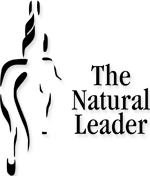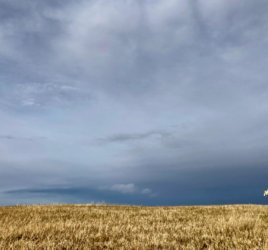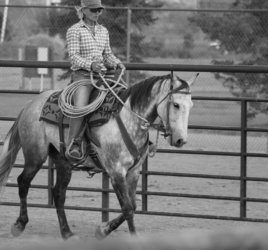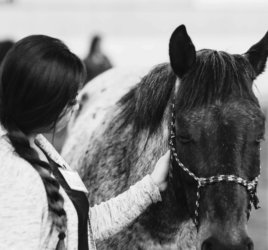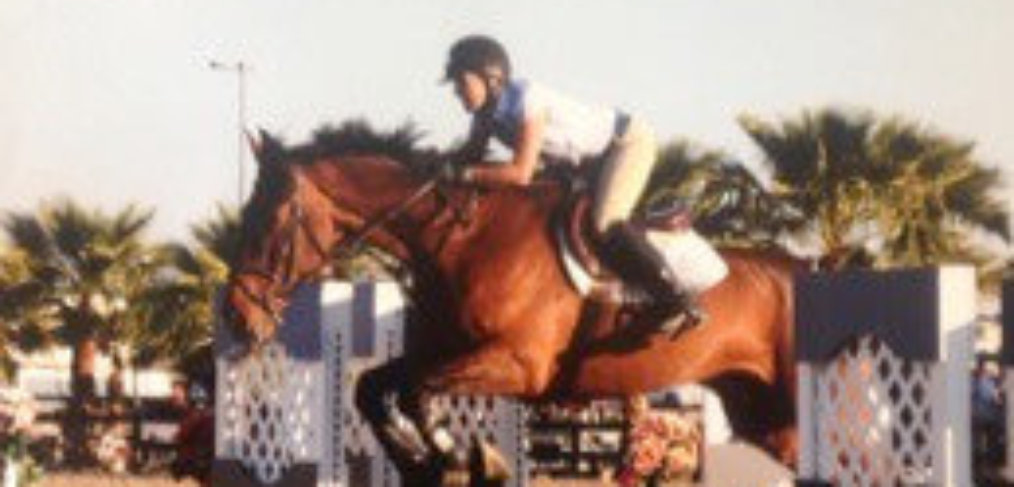
One foot in the Arena
This blog has typically captured my leadership learning through horsemanship journey, but there are a lot of horses in Alberta and that got me wondering “How have horses influenced others on their leadership journey?
So I began asking. In the coming months I will be publishing a series of interviews with those willing to share what they have learned about their leadership from their relationship with horses.
———-
Eva Friesen agreed to be my first interviewee.
Since 2005 Ms Friesen has held the position of CEO with The Calgary Foundation, prior to that she spent fours years at The Calgary Health Trust. Through twenty two years with the YWCA in three Canadian cities Eva developed her leadership style. She generously shared what horses have taught her about leadership and life.

Eva’s first horse entered her life at age 12, no lessons, riding the country side what she called country bumpkin style. Over the years school, career and then family took over and her time with horses was sporadic.
Horses came back into her life from the pleading of a horse crazy daughter. So when her youngest was old enough to ride, she encouraged her mom to join her in lessons, “Eva didn’t need another invitation”, she knew it was time to get back in the saddle. That was fifteen years ago. Eva’s competitive spirit found a home in her journey into the world of arena show jumping. Eva and her daughters still ride together saying “it is the best thing our life.”
We talked for well over an hour so there was much I simply couldn’t include to keep this to a reasonable length. This is in part was our conversation.
———-
Q: Through the years working with horses, what have you learned about yourself?
EF – Getting ready for the interview I considered three things.
The first one is: New data has real trouble penetrating knowing. So if you think you know, then you are not open to new information. How true in all of life.
I went to Ireland 2 years ago to purchase a horse. Having read about him and viewed the videos I knew he was the perfect horse for me. When I rode the horse I knew was my next horse, he bucked me off.
He bucked me off three times before I acknowledged he was not the right horse.
I was so convinced that horse was my next horse it took three injuries, three big bucks, three episodes to receive new information.
How often in life do we do that as leaders? Especially as we get older and more experienced, we really deeply believe we know and new information can’t penetrate.
So my lesson, always be open to new information. Don’t let knowing stop you from upgrading your knowing.
———-
The second big learning.
There is nothing that is insurmountable with patience and effort and trust building. Nothing.
The horse that I now have, spooks at things on the edges, if there is something outside his range of vision or a sound that rattles him he will bolt.(take off)
My trainer suggested ear plugs might help. It took 3 people and an hour to get them in the first time that was in February, it’s now August and I am 100% independently doing the process and when I start he puts his head down.
Perseverance, patience and trust building. You have to believe you can do and just have patience and trust, but if you just give it the time and build the trust, it is possible.
There is nothing that is insurmountable. You have to believe you can do it and have patience.
———
So I have one more thing. Sometimes the instinctive thing we do, the first gut reaction is not the right one, it’s not effective one.
When my horse spooks, the instinctive reaction for me was to take the leg off, (take away the pressure of my leg). In English riding we talk about being ahead of your leg and in your hand. If you leg off, you don’t have control. I have learned that if I keep him in my hand so when the environment is new and he’ll do his “ah”, I can feel his quivers because I am there, he bolts and lurches much less frequently.
How many times in life, we have instinctive reactions that are not the most effective ones, The challenge is in overcoming them. I do that with my horse by supporting him through it, by being fully present which he interprets from leg on.
There is no free ride. From the moment you get on your horse to the minute you get off, you are working and doing something, you are never just sitting.
Leaders are the same, there is no time when you are just present without really being there. Just occupying the chair.
————-
We talked a little about how horses offer us new perspectives on how we show up. Another story about a horse she leased to go down to a series of shows in Thermal California.
Before I had the horse I have now I leased a horse to go down to show for 3 weeks in Thermal CA. It’s something my daughters and I do every year. What the owners neglected to tell me when he (the horse) is in an environment that wasn’t at home he goes nuts in the warm up arena. I’m not a pro so I need to warm up for me!
I was a little bit beside myself and my trainer said: “Eva, this the horse you have, it’s what it is. Take it or don’t ride him. It’s your choice.” I didn’t come there not to ride, so I decided “It’s the horse I had”, I’d come here to show so, “What am I going to learn from this?”.
I learned to cope with his anxiety and not having my own. Both of us couldn’t be having anxiety. I learned to accept his anxiety and cope with it without being rattled. It’s the horse I had and we did it.
When we came home I was a way better rider thereafter on horses I tried, because I accepted the horse’s antics and I didn’t let it rattle me.
So I think to myself how often in life do you go do a talk, go into a negotiation, it’s not what you expect or its not at all or even the team members you expected, well this is the situation we got right now so you improvise and maybe you change yourself. Certainly I changed myself and it’s only been for the better.
————-
When things don’t go as you expected or planned. What do you find yourself doing when you recognize that moment in the boardroom?
I’ve learned to be silent first and listen. To understand the situation that is, when it isn’t what I thought it was. Don’t let knowing get in the way.
So here’s my clue – my nature is to be a hot and quick reactor. My first nature is not to be thoughtful, it’s not me, so when I feel that I want to jump in I start write. Sometimes I just write “don’t jump in, don’t jump in” mostly I write what I hear. I’ve trained myself to listen and take in before I speak, because sometimes what I’ve come prepared to offer isn’t what is needed. That is my trigger to listen and be open.
You listen more when you go into unknown situation.
————-
How have horses changed you as a leader?
The biggest impact horses have had on us. When my husband died of cancer 10 years ago we had just got into horses. He was a champion downhill ski racer and when he asked me why it’s so hard to get the girls up to go skiing at 6 but they will get up at 5 for a horse show. I said: “I guess they’re passionate about horses.” – he didn’t get it.
When I was on a horse the troubles of my life was not on my shoulders. I remember very clearly, the only time I didn’t worry about the pending loss of my husband and the girls dad was when I was on a horse. It was the only time I didn’t think about it and when my feet hit the ground it’s like woosh the reality of oh ya my husband is dieing would pour on me. For an hour and a half I was so involved with being present with the horse, I didn’t think about the rest of the world.
When he passed we didn’t do the skiing or the hiking because that was where he had been present and now absent, we moved our lives to the barn because he hadn’t been at the barn. It was a way to overcome our loss. It was therapeutic for us the value of the horses in our grieving process and in the loss. It was just amazing. It is the biggest thing of the value of the horses. There is nothing better for a soul than the outside of the horse.
————-
If there was one learning you could share with your team about working with a horse. What key learning do you believe they would gain?
Horses’ pick up your non-verbal cues in a way you are not even aware you have them.
One of the rules in jumping is your eyes go over the jump, not down. The horse can tell if your eyes go down, if you want an inside turn the horse will turn because you looked.
A horse can feel a fly on them, a fly is pretty small and a horse is pretty big. The horse is so perceptive to the non-verbal cues we give off, it’s phenomenal – whether it’s anxiety, confidence or where we looked.
People too react to non-verbal cues, whether we are aware of it or not. Sometimes you didn’t have a good experience, you didn’t like someone, it can be because of all the non-verbal and you couldn’t even pin it.
The awareness of the many ways we communicate is probably the first thing a person may learn, which translates into life.
———-
Thank you Eva!
Nancy Lowery has been blogging about her Leadership Learning through Horsemanship Experiences for over ten years. This series began as “One Foot in the Arena” to explore what other leaders in Calgary have learned about their own leadership through their relationships with horses.
To explore how a day with horses can complement your Leadership Training programs Nancy would love to hear from you.
